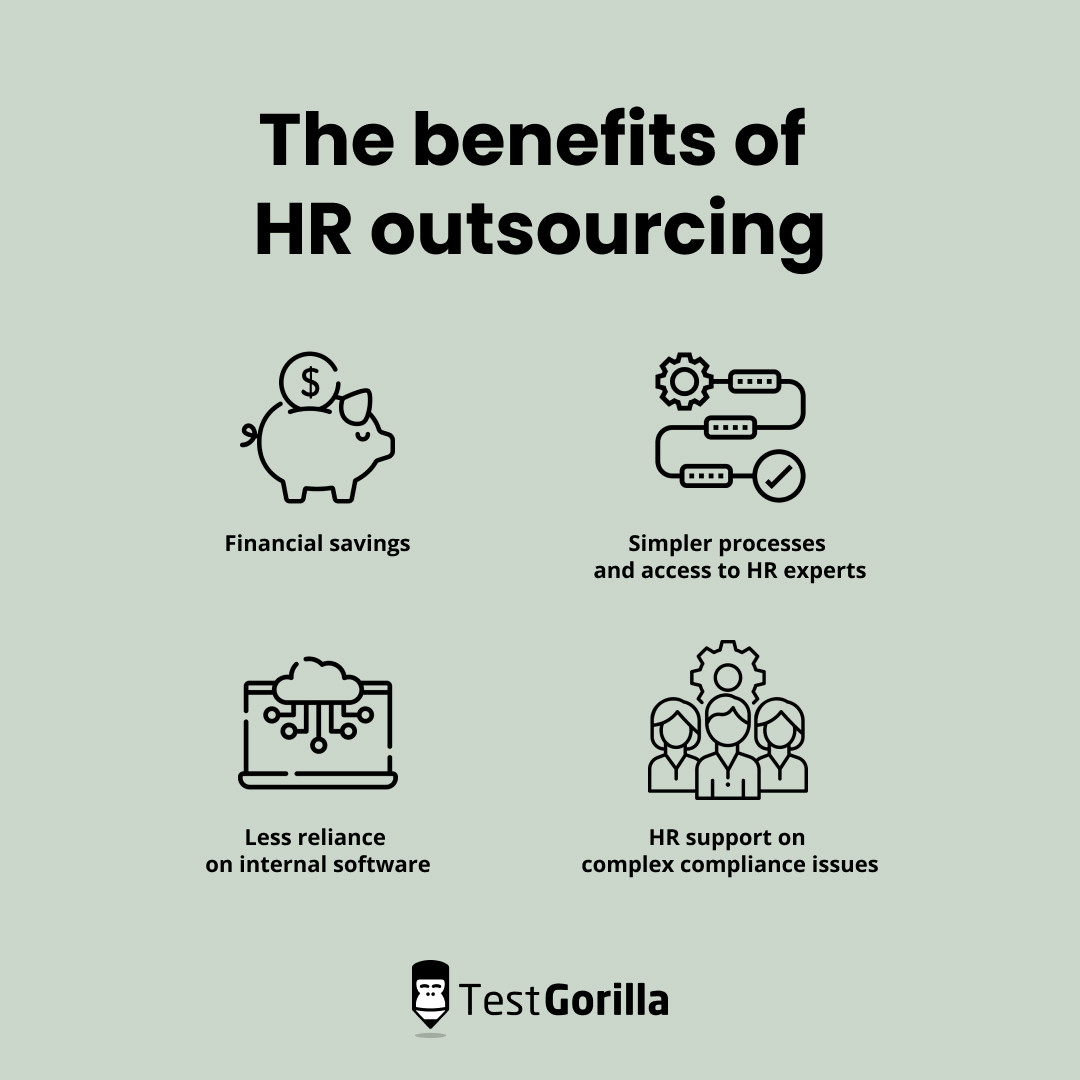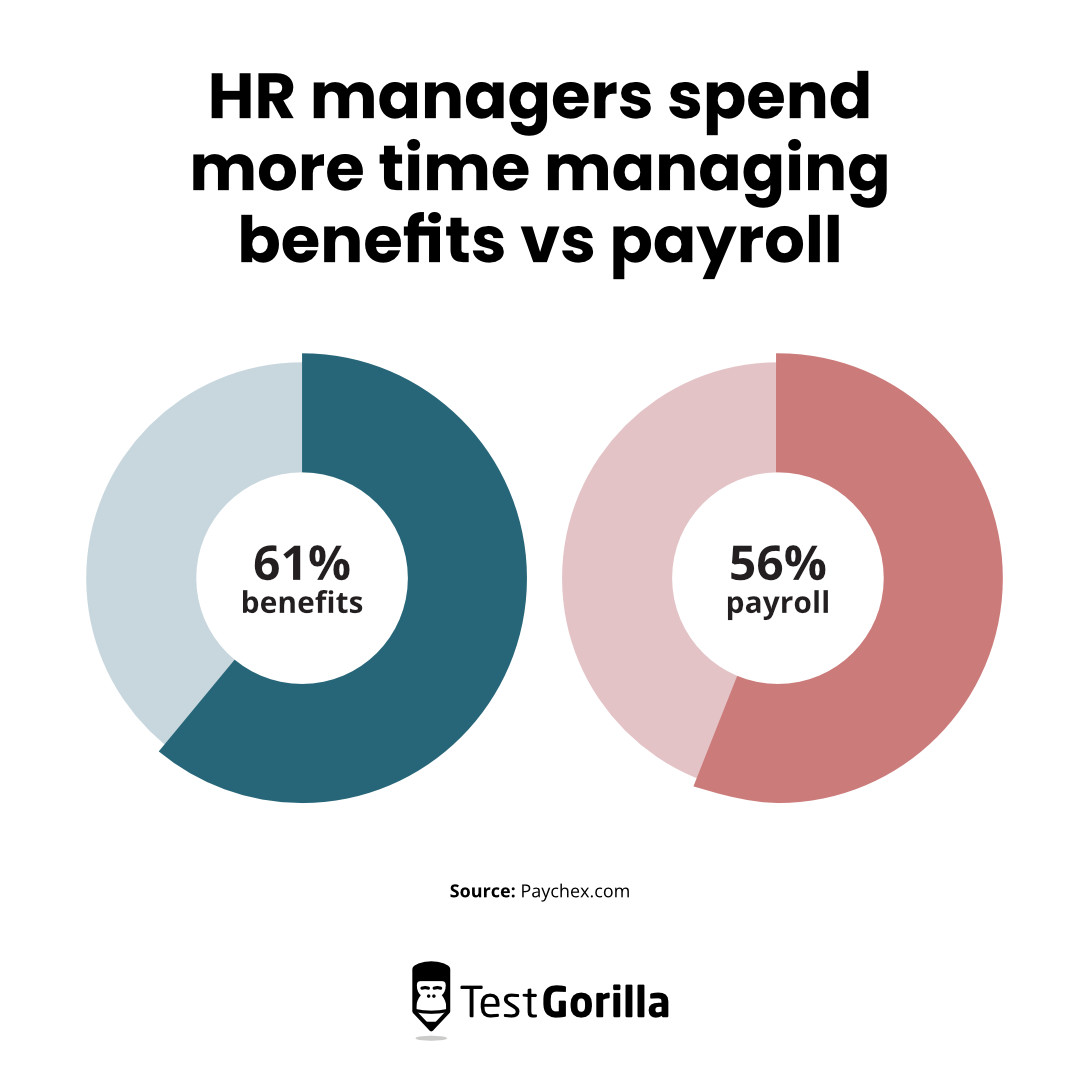HR outsourcing is a common practice, and it’s only gaining more popularity during a skills shortage where acquiring talent is at the top of everyone’s list.
The two main reasons companies choose to outsource are to save costs and to free up additional resources. It might cost less than hiring a dedicated HR manager, and it also gives you more security with complicated issues like compliance.
But outsourcing isn’t for everyone.
Instead of solely focusing on the short-term benefits, it’s crucial to consider when and where you need outsourcing – if your company needs it at all.
Outsourcing HR is a great tactic for some, but if used for functions you don’t need, it’s a waste of effort and money.
This article provides a critical evaluation to help you evaluate HR outsourcing pros and cons and which functions are best to handle in-house.
And if you discover that outsourcing is for you?
We also cover the top companies that provide human resources outsourcing. If you’d like, you can jump ahead to our recommendations.
Table of contents
- What is HR outsourcing?
- Why do companies and HR professionals turn to human resource outsourcing?
- The benefits of HR outsourcing
- The drawbacks of HR outsourcing
- Which HR functions can you outsource (and why)?
- Which HR functions should stay in-house (and why)?
- The 6 best practices for outsourcing HR functions
- What are some of the best HR outsourcing services?
- Build an HR outsourcing strategy perfect for your organization
What is HR outsourcing?
HR outsourcing is when you connect with an external source to handle some or all of your human resources functions. This is generally done to save time, effort, and costs.
Some of the most common functions are recruitment process outsourcing, payroll management, compensation and benefits administration, and performance management.
Of course, there are multiple types of HR outsourcing services depending on your organization’s needs. Let’s quickly take a look at them.
What types of HR outsourcing exist?
There are two main types of human resources outsourcing services:
PEO services: Comprehensive HR outsourcing that uses a co-employment model, which means they essentially become a part of your company and help directly manage your people
HRO services: HR outsourcing that is a separate third party, which means that you’re still responsible for your people entirely
Here they are in-depth.
Professional employer organization (PEO)
A PEO is an extension of your business and uses a co-employment model. These organizations share liability with your company and engage directly with your management.
Generally, PEO outsourcing takes over all or most of your HR functions. This is why it’s a popular option for small- to mid-size businesses that don’t have the funds for a full HR department.
Because PEO outsourcing works directly with your people, you need to ensure that the HR outsourcing company understands your federal, state, and local employment laws.
PEO organizations directly enter a partnership with your organization, which means they share accountability and success with you.
Since they share your financial wins and losses, some PEOs may take their roles more seriously.
Human resources outsourcing (HRO)
HRO does not use a co-employment model. Your employees remain in your own company’s books, and you take legal responsibility for all their actions.
HRO is a broad, umbrella term that encompasses a few definitions:
Independent HR consultants
HR consulting agencies
Human resources SaaS companies
Because HRO is a separate third party, it’s more flexible, and you can outsource as many or as few functions as you like. This is common for larger companies because they may need to only outsource a handful of functions.
This makes HRO a much more adaptable, fluid option where you simply choose the functions you need for the moment.
Why do companies and HR professionals turn to human resource outsourcing?
What drives a company to switch from in-house HR functions to contractors?
There are many types of companies and many different needs, so the reasons vary greatly. You might seek HR outsourcing if:
You’re spending too much time on HR tasks versus other business needs
Your organization has liability exposure, previous lawsuits, and a high risk of future lawsuits
You lack the funding to pay and cover benefits for an in-house HR team
Your company is too small for an in-house HR department
Your HR staff is having difficulty balancing hiring tasks with employee management
Your HR functions are being spread across teammates from other departments, and it’s impacting their productivity and performance*
*About this last point: If spreading HR tasks across your team doesn’t impact quality and performance, this is an effective, agile strategy. For more insights, read our blog on talent sharing.
What’s HR’s role in outsourcing?
So what’s your role in all of this? If you’re outsourcing HR functions, does that mean your team doesn’t handle any of the work?
There are definitely a few parts of the process that require your attention.
Here are a few of the important tasks that your team handles:
Choosing a solid outsourcing provider
Maintaining good communication with providers
Reviewing results and ensuring the provider is keeping consistent quality
We discuss these points more later in our section on best practices.
Your personal role in outsourcing human resources requires much of the same understanding as organizational restructuring. Both can be confusing procedures with many role changes, and they need consistent, high-quality communication.
The benefits of HR outsourcing
Outsourcing HR functions is useful for some organizations, and it’s a lifesaver for others. But some companies don’t see the need to outsource at all.
We’ll explain why by covering both the benefits and drawbacks of outsourcing.
Let’s start with the benefits.
Financial savings
This is one of the most common benefits of HR outsourcing: cost savings.
The average salary of an HR manager is $116,000 plus benefits. For an HR department, you also need to pay for the salaries and benefits of the other full-time team members.
Generally, outsourcing providers are more affordable, with either fixed pricing or a per-employee per-month cost (PEPM).
Outsourcing HR also means you have less headcount. A higher headcount not only increases salary costs but also increases the number of people you have to train and manage.
This scenario is especially tricky in startups, so it’s helpful to outsource the tasks until your company grows.
Simpler processes and access to HR experts
If you don’t have an in-house HR team, these tasks fall on your other employees.
This brings up two main points:
HR duties are spread across people with other jobs, possibly decreasing productivity and performance
HR duties are given to employees that aren’t experts, which could lead to mistakes or complaints
Outsourcing your HR functions enables you to streamline the process and get access to specialized knowledge from people with years of experience.
Less reliance on internal software
Outsourcing HR tasks enables you to use less software, which also means you need less maintenance on software.
Lower IT maintenance costs may include:
Purchasing and licensing of the software
IT support, such as a help desk, running services, and cybersecurity
Training HR employees to use software
In a busy team with many complex tools to use, it may be beneficial to remove just one more piece of tech from their workload.
HR support on complex compliance issues
Ensuring that your company stays updated on laws and compliance is imperative. Violations can result in fines, penalties, and even lawsuits.
Outsourcing HR tasks makes sure that you stay up to date on important employee policies, like safety and anti-discrimination laws.
You can hand off complicated compliance matters to your provider, because HR outsourcing professionals are specially trained in regulations and adherence.
It also helps to outsource these tasks for a simpler reason: Handling delicate policies can be complicated and tedious. Even if every rule is followed strictly with no room for risk, it can be exhausting for you to handle.
The drawbacks of HR outsourcing
Now let’s cover the disadvantages of human resources outsourcing.
Loss of control over strategic HR functions
Outsourcing key functions gives you less control over them, and you may find that the service provider’s policies don’t align with your strategy.
This may also hamper your processes depending on your business’s size. As your company scales, you might find it difficult to adjust your strategies.
It isn’t impossible to find a flexible agency, but it is challenging. Providing the agency with as much information about your culture and values as possible can help mitigate this risk.
Risk of poor performance from the contractors
There’s always a risk that a contractor may not be as good as they claim. With HR outsourcing, you’re putting your employees and recruitment strategy in someone else’s hands, which could be detrimental.
This issue is especially a concern when you aren’t directly connected to the provider, which is the case with HRO organizations.
PEO companies may have reduced risk of poor quality because they share your successes and failures, driving their motivations.
Potential cultural changes and shocks
It’s vital to ensure a good culture match with this agency. They’re nearly going to be a part of your organization, so it’s best if they reflect your values and attitude.
They’re also going to be working closely with your people, and it could be jarring for your employees to contend with a vastly different mindset whenever they interact with them.
For example, your team members might communicate best in casual speech, using emoji and abbreviations. This could be a culture shock to both parties if the HR outsourcing services you choose are highly formal.
Limited on-site access to HR reps
For many workers, it’s a natural right to turn to HR whenever they need help with a work conflict or they need to speak about their professional growth.
It could discourage employees from seeking help if they have limited (or no) access to HR specialists on-site.
Vendor instability
When hiring from a contractor, you always risk an agency changing its practices, policies, and staff.
This could be frequent changes in reps, loss of knowledge, or even a restructuring of policies and packages.
A sudden change is often difficult to manage, but this can be especially detrimental if your service goes from stellar to below average.
Cyber security risks
Electronic security is one of the most important things to a company. It keeps you and your customers safe.
Data leaks, server failures, or even errors surrounding local laws are possible when outsourcing.
It’s important to ensure the agency you choose is HIPAA compliant and has a track record of good security.
It’s also crucial to lay out all laws and regulations you need to follow ahead of time, particularly local laws or laws specific to your sector regarding data collection and informed consent.
Which HR functions can you outsource (and why)?
Some HR functions are ideal for outsourcing. They save you time and money, with few drawbacks.
Here are our top recommendations for the ideal HR functions to outsource.
The best HR functions to outsource: A summary
Functions | Description |
Compensation and benefits | Outsourcing payroll reduces errors, which can be costly; Managing benefits packages uses a lot of an HR manager’s time, and outsourcing frees it up for other tasks |
Workforce admin | Outsourcing essential functions like data management and policy support take the strain off of your team |
Compliance | Having a trained professional handle a delicate subject like compliance mitigates risk and reduces tedious administrative tasks |
Recruitment | Outsourcing recruiting professionals helps when your hiring manager isn’t a talent acquisition expert; Outsourcing pre-employment assessments helps objectively evaluate candidates |
Development | Using learning and development experts to upskill employees helps ensure training is successful; Outsourcing development is a good option for small business owners with a limited budget |
Rewards and recognition | Outsourcing employee recognition allows a third party to set up and manage incentive programs |
Compensation and benefits
HR outsourcing can help manage compensation, payroll processing, and employee benefits. This is one of the most common reasons to outsource.
It’s popular because payment- and benefit-related errors are costly and damaging. It’s imperative to have workers with specialized knowledge handle this type of work.
Providers can help with:
Payroll calculation
Taxes
Producing and delivering checks, as well as direct deposit
W-2 forms
Handling signatures
Outsourced providers can also help you create a benefits plan and manage employee eligibility.
This is helpful when research shows that HR managers generally spend more time managing benefits than payroll.[1]
For insights on this subject, read our blog on compensation and benefits.
Workforce admin
Workforce admin encompasses a handful of essential HR functions that consist of:
Development, maintenance, and operation of HR systems
Employee and manager policy support
Employee and manager customer service
Employee data management
These are necessary functions, but they can be incredibly time-consuming.
Workforce admin is a foundational function to outsource, like payroll and performance management. These three functions are commonly outsourced together as a package.
Compliance
Outsourcing HR compliance enables you to put delicate matters into a certified professional’s hands.
There are specific regulations and specifications your organization must follow, and errors in this field can be very punishing.
And it gets more complicated. Your regulations may differ depending on your industry, type of business, and business size.
But an HR consultant ensures you comply with:
The Family and Medical Leave Act
Workers’ compensation
Department of Labor requirements
Unemployment responsibilities
They can also help you handle employee handbooks and policy updates, as well as create safety programs and guides.
Recruitment
Recruitment is a nuanced subject, and we believe some elements can be outsourced and some should remain in-house.
Skills, personality, and culture tests are essential to the future of hiring, but they’re almost impossible to create in-house.
Skills tests need to be built by subject matter experts who know the ins and outs of a role. They also should have some level of personalization.
These two points alone would mean a massive initial investment if you were to create them yourself. But sourcing software only requires a subscription cost.
It’s also a good idea to outsource a recruiting expert if your team doesn’t have a trained hiring professional.
Many hiring managers are experts in their own field and aren’t specifically skilled in recruiting. For example, a hiring manager in a sales department is most likely primarily trained in sales.
But true hiring professionals have the skills to spot a great candidate and are able to make relevant, accurate hiring decisions.
We recommend outsourcing a skilled recruiting expert, then supplementing their work with objective hiring methods like skills assessments and job simulations.
Development
Development is another area where we recommend outsourcing some of the time but also keeping certain functions in-house.
Use this link to skip ahead to in-house development.
Training is a common HR function to outsource. In fact, 45% of US companies outsource learning and development.
It’s good to outsource development when your training needs are wide and diverse. It’s also important when you simply don’t have the staffing and time, and using current employees would stretch them too thin.
This also falls into the same position as recruitment: Unless you have the skills to train another worker, it simply won’t work.
Teaching is an important skill in itself, and even high-performers in a certain field may not possess the knowledge of how to pass their skills on.
For example, your team might have an excellent programmer, but their skill doesn’t necessarily mean they possess the capabilities to pass their knowledge on to a junior coder.
Rewards and recognition
Recognition is key to retaining satisfied employees, but creating and managing an employee incentive program is difficult and time-consuming.
HR outsourcing can create and manage a recognition program for you, signing up workers, doling out spot awards, and locating good incentive companies, such as those offering wine baskets or other gifts.
Note that this type of recognition is the kind that you might use to celebrate a work anniversary – the kind that involves plaques, food, and company swag.
The other kind of recognition, the type that involves coaching and relationship-building, we recommend keeping in-house (we touch on this further down).
Which HR functions should stay in-house (and why)?
Some functions require a more personal touch and are better handled in-house.
Here are our top recommendations for which HR functions shouldn’t be outsourced.
The best HR functions to handle in-house: A summary
Functions | Descriptions |
HR Strategy | Keeping your people strategy in-house is ideal because it’s directly linked to your values and culture |
Performance management and coaching | Coaching should be done by an employee’s direct manager to keep things personal and help build relationships |
Culture and diversity initiatives | Handling subjects like diversity needs special attention that can only be achieved by your own people |
Recruitment | Creating interview scripts, conducting interviews, and writing job descriptions are all personal to your companyRelaying these job descriptions to an external recruiter is a great way to combine in-house and outsourcing |
Development | Training programs that are highly specific are best handled in-house to avoid details being misinterpreted by outsourced instructors |
HR strategy
Your HR strategy is something personal, linked to your values, culture, and processes, and it directly affects how your business runs.
Structuring your strategy is something that should be done by your people because they not only have a solid idea of your organization’s priorities, but they also share a common goal.
Performance management and coaching
Performance management should be handled in-house because it not only helps you develop stronger relationships with your employees, it also helps you understand the skills and performance needed for a role.
This helps you write better job descriptions and clarify roles and responsibilities.
We recommend regular 1:1 meetings to give employee feedback, ask for feedback, and supply constructive coaching.
For more information, read our performance management guide for hiring managers.
Culture and diversity initiatives
Culture initiatives, like diversity targets, are not only particular to an organization, but they’re also a delicate subject.
Diversity and inclusion targets can be tricky. Done wrong, they don’t promote true inclusivity, which means they should be handled with careful consideration.
Even well-intentioned recruiters may hold unconscious biases, affecting your diversity metrics negatively.
It’s also important to consider how they’re implemented.
Keeping in mind how diversity initiatives are crucial to an organization’s corporate social justice plan, you have to be careful when forming them to avoid certain issues, like being labeled a “brand activist.”
For more information on this topic, read our blog on DEI initiatives.
Recruitment
As mentioned above, recruiting can be tough to properly conduct in-house unless you have a hiring expert on hand.
If you do have a recruiting expert on staff, of course, we recommend using them. But we’re here to recommend a few other functions you can handle in-house, even if you’re using an outsourced hiring expert.
Here are the top recruitment processes we recommend in-house:
Creating and managing structured interview scripts
Conducting structured interviews
Writing job descriptions
About this last point: It’s important for an in-house manager to write job descriptions because they have in-depth knowledge about the skills, personality, and motivation needed to succeed in the position.
They can then share this job description with an external recruiter to let them know what to look for in a candidate.
Development
If you have specific development plans, it’s best to execute the strategy yourself rather than try to explain it to another party.
Your training plans may be complicated. In fact, you may have a specific procedure that works for you, but other organizations wouldn’t understand.
You can also do a few steps of development internally, then finish externally.
For example, you can create professional development plans in-house to help solidify your employees’ goals, then have the worker complete their training with an outsourced provider.
The 6 best practices for outsourcing HR functions
Outsourcing isn’t for every company, but for those organizations that decide it’s best, we’re here to offer strategies to ensure it goes smoothly.
Best practices for HR outsourcing: A summary
Strategy | Description |
1. Take the time to fully understand your needs | Determine your current HR services and your company’s future needs |
2. Find the right contractors | Evaluate available contractors and make a list of the most well-suited providers |
3. Create a detailed outsourcing agreement | Write out a clear statement of work describing the expectations and responsibilities of the provider |
4. Manage the ongoing relationship between the company and the contractor | Oversee the transition from internal HR to external HR functions; Manage the ongoing relationship with consistent communication |
5. Review the results | Ask your people for feedback and monitor performance metrics; Share results with the contractor to provide feedback |
6. Leverage solid HR software | Use modern HR technology to handle many HR functions, such as payroll processing and applicant communication |
1. Take the time to fully understand your needs
The first step is understanding what your company needs HR outsourcing for.
This means you need to determine the existing HR services, responsibilities, and available budget to choose a provider.
Take time to document which functions you need and which you don’t, keeping in mind your organization’s future requirements and possible growth.
For example, you may not need development outsourcing right now, but your projected growth may show a major increase in workers in the next three months. In this case, it would be a good idea to plan for future training.
2. Find the right contractors for your organization
There are thousands of HR outsourcing services out there, and choosing the right one is crucial.
We recommend establishing a shortlist of outsourcing suppliers. This includes talking with companies who currently use them to gauge their satisfaction and considering if the outsourcing provider matches your company culture.
Take your time sorting through providers, reading reviews, and talking with your team about which company would suit your HR needs best.
3. Create a detailed outsourcing agreement
This step is foundational. An outsourcing agreement tells the service provider what’s expected of them and allows you to monitor performance and progress.
Take the time to identify key metrics, such as benchmarks of acceptable performance ranges, and include them in your service agreement.
It’s also important to clarify your own policies and regulations before entering an agreement. Read the fine print of the service agreement with your company’s legal and compliance officer to ensure everything lines up with your organization’s policies.
4. Manage the ongoing relationship between the company and the contractor
Overseeing the transition and managing the provider relationship is an important part of outsourcing. Depending on the organization, you may even choose a relationship manager to handle this task.
This starts during the early stages when you’re transferring processes from in-house to external. This is a critical moment, so it’s imperative to keep in close contact and leave nothing unsaid.
After the relationship is established, you should maintain strong communication and bring up any questions or conflicts before they escalate. Even the best provider won’t be as effective if you don’t communicate and monitor performance.
5. Review the results
It’s a good idea to regularly review the results of your HR provider.
This means gathering feedback from your employees and evaluating your own benchmarks to ensure you’re getting the results you need.
These results aren’t just for your information – share them with the outsourced HR contractors to update them on their performance and your expectations.
This helps them know what isn’t working, but it also reinforces what is working.
6. Leverage solid HR software
Using software and tools is an HR solution that most companies can take advantage of: It’s cost-effective and accessible to nearly every organization.
The rise of technology has facilitated many common HR functions, enabling you to handle a few key processes in-house but outsource most lower-value tasks to SaaS tech.
HR software has compliance built-in, and it can also help manage employee benefits and payroll administration, as well as recruitment tasks like applicant communication and evaluation.
For more details, read our blog on online recruitment platforms.
What are some of the best HR outsourcing services?
There are thousands of HR outsourcing services out there, so let’s check out a few of the best to get you started.
Here are a few ideas:
Paychex: A provider of human resources services, such as payroll and benefits, that primarily serves small to midsize businesses.
Trinet: A provider of HR administration services, such as payroll processing, health insurance benefits, compliance regulation, and risk management.
ADP: A provider that offers payroll and benefits management, recruitment and new hire onboarding plans, and employee insurance programs.
Insperity: A full-service provider that helps small to midsize businesses manage payroll services, recruitment, performance management, and HR consulting.
G&A Partners: A provider that specializes in small businesses, offering 1:1 support to its clients. It specializes in training, payroll tax management, and compliance management.
We also recommend diving into the world of HR software to help you manage payroll, recruiting, and applicant tracking.
Build an HR outsourcing strategy perfect for your organization
Outsourcing isn’t the solution to everything, but it can be the right choice for many HR tasks.
Human resources outsourcing is great for certain functions, such as compliance and admin, but it’s best to keep recognition and diversity initiatives close at home.
And certain functions, like recruitment and development, have their place both internally and externally.
The next step is a crucial element of your HR and people strategy – adopting employee retention strategies, a good many of which can be outsourced.
If you’d like to browse our database of more than 300 skills tests, check out our test library for more information on HR assessments.
Source
“HR Issues: Common Problems Employees Have With HR”. (September 11, 2017). Paychex. Retrieved July 2, 2023. https://www.paychex.com/articles/human-resources/employees-common-hr-issues
Related posts
Hire the best candidates with TestGorilla
Create pre-employment assessments in minutes to screen candidates, save time, and hire the best talent.
Latest posts
The best advice in pre-employment testing, in your inbox.
No spam. Unsubscribe at any time.

Hire the best. No bias. No stress.
Our screening tests identify the best candidates and make your hiring decisions faster, easier, and bias-free.
Free resources
This checklist covers key features you should look for when choosing a skills testing platform
This resource will help you develop an onboarding checklist for new hires.
How to assess your candidates' attention to detail.
Learn how to get human resources certified through HRCI or SHRM.
Learn how you can improve the level of talent at your company.
Learn how CapitalT reduced hiring bias with online skills assessments.
Learn how to make the resume process more efficient and more effective.
Improve your hiring strategy with these 7 critical recruitment metrics.
Learn how Sukhi decreased time spent reviewing resumes by 83%!
Hire more efficiently with these hacks that 99% of recruiters aren't using.
Make a business case for diversity and inclusion initiatives with this data.



















